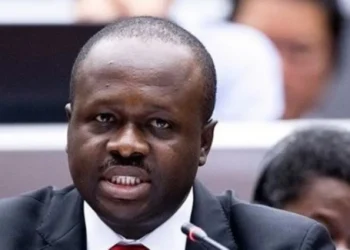Ghana is reeling from a tragic helicopter crash that claimed the lives of eight individuals, including two highly esteemed Cabinet Ministers, on Wednesday, August 6, 2025.
The military aircraft, on an official mission, crashed under undisclosed circumstances, prompting a wave of shock, sorrow, and national reflection. The incident, described by many as one of the darkest moments in recent national memory, has prompted the postponement of key government and public events as the country enters a period of mourning.
Among the victims were Dr. Edward Omane Boamah, Minister for Defence, and Alhaji Dr. Ibrahim Murtala Mohammed, Minister for Environment—two distinguished statesmen whose careers were marked by integrity, service, and an unwavering commitment to Ghana’s development. Their untimely deaths have not only left a void in the public sector but have also reverberated across industries, including Ghana’s financial sector.
Banking Industry Pays Solemn Tribute
In the wake of the tragedy, the Ghana Association of Banks (GAB) issued a heartfelt statement expressing deep sorrow and extending condolences to the bereaved families, the Government of Ghana, and all institutions affected by the disaster. Referring to the incident as a “national tragedy,” the Association acknowledged the profound impact of the loss and emphasized the collective grief shared across the banking industry.
“The Ghanaian banking industry stands with the nation in mourning the tragic loss of distinguished public servants and professionals,” the GAB’s statement read. “We extend our heartfelt condolences to the families, the Government of Ghana, and all institutions affected by this national tragedy. May their souls rest in perfect peace.”
The statement underscores the close-knit nature of Ghana’s institutional framework, where the lines between public governance and private enterprise often intersect in nation-building efforts. For the banking sector, which works closely with government ministries on development financing, economic planning, and public-private partnerships, the loss of such key figures is both personal and professional.
Impact Across Public and Private Sectors
The helicopter crash has cast a long shadow not only over political circles but also across corporate Ghana. In many banking halls and financial institutions, flags have been flown at half-mast, and moments of silence observed in honour of the departed. Scheduled meetings, public engagements, and corporate events have either been postponed or cancelled in observance of national mourning.
Several CEOs and senior executives within the banking industry have also taken to social media and official channels to express their sorrow. Many described the deceased ministers as visionary leaders whose policies helped facilitate investor confidence, environmental governance, and defence-sector stability—all crucial elements for a thriving economy.
The banking industry’s response to the tragedy is a reflection of the broader national sentiment: one of unity, reverence, and a renewed call to continue the work started by those who have fallen.
In mourning, the sector is also using this moment to reflect on the values that underpin national development: collaboration, patriotism, and service. The Ghana Association of Banks has urged all member institutions to honour the memory of the fallen through their continued dedication to ethical leadership and national progress.
READ ALSO: MTN Powers GSE Surge as Market Defies Slump in Turnover



















